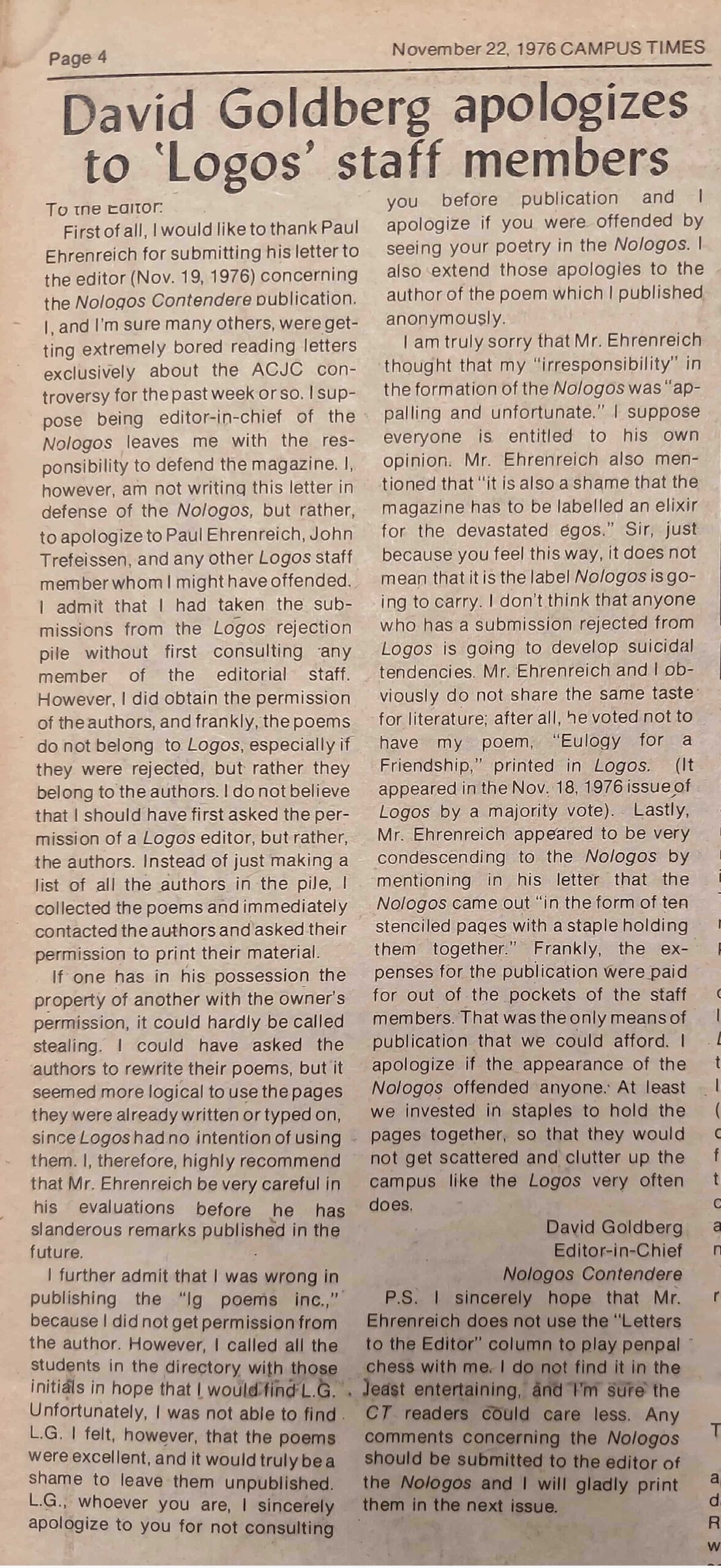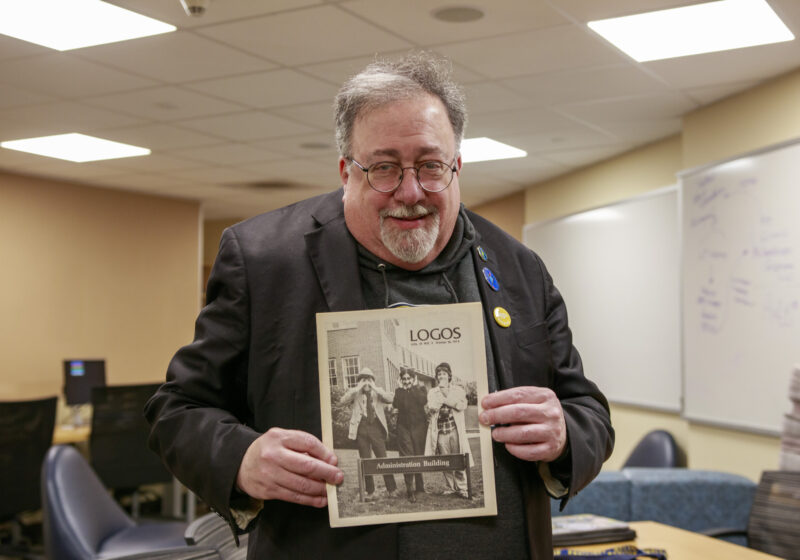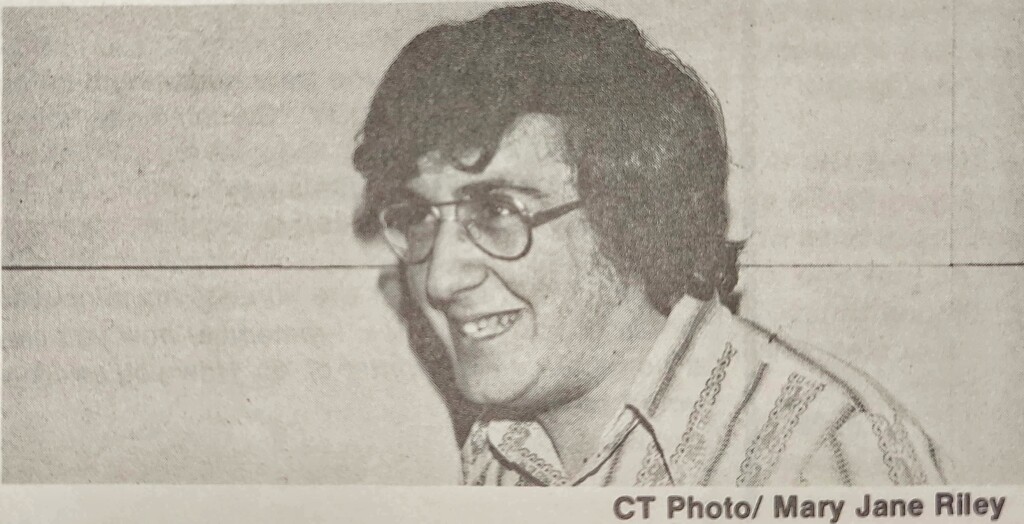This past year, I have been on a mission to put together the history of LOGOS, the University’s art and literature journal and the oldest publication on campus. One evening a few days before Meliora Weekend 2022, I got an email that unexpectedly ended up being a pivotal puzzle piece in this undertaking and a fitting last hurrah as I transition out of the roles of Culture editor for the Campus Times and Editor-in-Chief for LOGOS.
Daniel Kimmel (’77) is a film critic, a humor writer, a 2018 Skylark Award winner, a former Boston correspondent for Variety, and a past president of the Boston Society of Film Critics. He is also the author of several novels and essay collections, and was the Fall 2019 Neilly Author Lecturer on campus.
Most importantly to the Campus Times, however, Dan was LOGOS’ resident humor columnist between 1974 and 1977.
Like most things, his involvement in LOGOS goes back to the CT-LOGOS rivalry of yore. As a sophomore, Dan initially wanted to do a regular column for the Campus Times, but the newspaper did not yet have a humor section. Turned away by the CT, Dan knocked on LOGOS’ door instead and was encouraged to start a humor column for the then-biweekly, now-annual magazine.
Ironically, CT also had a role to play in Dan’s three-year stint at LOGOS unexpectedly coming to a close before the end of his senior year. At the time, it was tradition for the last issue of the year to be done by the incoming editorial staff, but he hoped he would get to do one last column before he graduated. However, the new team “got rid of all the seniors,” Dan said. “They dropped my column and apologized years and years later,” but that article ended up running in the CT in 1977 instead of in LOGOS (not the first time pieces have been stolen and swapped between the two publications; see “David Goldberg apologizes…”).

In the November 22 1976 edition of the Campus Times, the Editor-in-Chief published an apology for publishing poetry rejected from LOGOS without permission of the LOGOS editor.
That Friday afternoon during Mel Weekend, for what I’d like to think might have been the first CT-LOGOS olive branch in UR-history, Dan and I sat in the Campus Times office with a stack of old LOGOS editions between us. High-spirited, animated, and full of stories about the ghost of UR past, Dan pulled out the December 1974 edition and brushed the dust off.
“This was one of the first columns I did — not a good column,” he prefaced. The article was a “comical take-down” of a Campus Times writer who was writing “a lot of controversial stuff,” which is code for bigoted views. Titled “Who is He?”, the article was a satire investigating the true identity of the writer, because no student could possibly express their unbelievably offensive views so unabashedly.
“That’s the nice thing about [LOGOS],” Dan said. “They let me try out a lot of different ways of doing humor.” Many of the pieces we discussed poked fun at various aspects of life on campus, but Dan said that LOGOS allowed him to experiment by throwing everything at the wall and seeing what sticks. This included humorous quizzes, a Dick and Jane-inspired piece on the pitfalls of UR dining, a parody of Currents (the University’s PR magazine at the time), and a Jonathan Swift-inspired piece on curved grades that took after “A Modest Proposal,” among other pieces.
“My subject was the campus,” he said. “I have a feeling most of the administrators were not used to being made fun of this way.” Everything was fair game, and Dan was known for taking shots at President Robert L. Sproull. In February 1975, he wrote an open letter to the newly-appointed President, reviewing his inauguration speech as if it was intended to be a comedy monologue. In the article, he complimented Sproull’s “subtle wit” and the prowess of his “gag writers,” saying he could only hope to write humor pieces at par with Sproull’s speech.
“If we really need a good chuckle, we can always turn to the Campus Times editorials or our term bills,” Dan concluded. The letter was followed by a postscript that read: “I think it was a tactical mistake to tell us that the cost of going here is equal to the price of a new Chevy. You see, sir, some of us have been talking it over, and frankly, we’d rather have the car.”
The following year, Dan wrote another article commending Sproull’s decision to schedule a Town Hall during dinner to minimize attendance. However, for the February 1977 issue, he flipped the script — he wrote an article as Sproull’s alter-ego, Robert Sprowl. Titled “Dan Kimmel: Madman or Lunatic?”, the article portrayed Dan as a hostile, hysterical, ungrateful student, foaming at the mouth as Sprowl insisted that he only had the students’ interests at heart.
Years later, during his time at the Boston University School of Law, Dan ran into Sproull at an alumni event and told him about a realization he’d had. Compared to the notoriously unpleasant and controversial BU President John Silber, Dan had realized that Sproull was a “pussycat.” According to Dan, Sproull replied, “That’s the meanest thing you’ve ever called me.”
Sproull was not the only administrator to acknowledge Dan’s criticism. During his senior year, LOGOS did a show in the May Room that was based on the journal’s humor column, called “Unrestricted Donations.” “It was the one thing we all promised never to give the University: a blank check,” Dan said. Now, Dan contributes funding to areas such as student activities, scholarships, and residence halls, but he remained true to his word regarding unrestricted donations.
To his surprise, two administrators and their wives came to see the LOGOS show that evening. Despite his very vocal criticism of the administration, Dan still thinks of them appreciatively. When one of them passed away, Dan wrote a letter in the alumni magazine, remembering him as a “real class act [for coming to the show] and [offering] to buy a round of drinks for the cast.” Dan said that the sister of the deceased wrote back, thanking him for remembering her brother so fondly.
Memory was a throughline in our conversation. As we flipped through the yellowing copies, Dan told me he had been trying to reach out to someone from LOGOS for years. I asked him what it meant for him to be a part of the journal, and his eyes softened.
“It’s funny, it gave me my identity on campus […] people remember me as the funny guy.” He told me he does a humorous speech at every five-year reunion, and that at tonight’s dinner, he would be introduced by the class president who beat him in student body president elections. Perhaps that loss was a blessing in disguise; Dan looks forward to his recurring speech, and is often asked by classmates to reveal his jokes in advance. To them, he says, “I don’t want to spoil tonight,” but he gave me a sneak peek of a joke he was confident I wouldn’t leak to the Class of ’77. The bit involved the school’s reunion committee, the unprecedented perks of aging, and a healthy dose of morbid humor.
“One of my classmates came up to me today and said that he remembered my column,” Dan told me proudly. He also said that, in addition to finding an audience and an identity, LOGOS helped him find his voice. He’s been told by people that they can hear his voice when they read his work. “I know enough authors to know that it isn’t common — apparently I write in my voice and it’s really hard for me not to.”
The first time Dan was told he had a distinct authorial style was when he submitted to LOGOS, and it made him “return to humor writing time and time again.” It also helped him avoid “the kind of pompous [film] criticism that [he] doesn’t enjoy reading.” Instead, in both his humor and film writing, he focused on giving a unique take “on our shared experiences.” Perhaps not much has changed since Dan graduated: although he was referring to the shared experiences of his target audience – UR students in the 70s – his articles continue to be relevant today.
I was curious about what had changed. Dan’s voice dropped to a conspiratorial whisper. “Oh, the food is much better,” he said. “Oh my God, all the choices and the design [at Danforth]. It used to be a totally different experience.”
I assured him that the food was only impressive for Meliora Weekend and Orientation, and we both agreed that that was one thing that had stayed the same. He also commented on the new buildings that pop up every time he visits. It took much longer for buildings to be finished when he was a student. In fact, his humor column was often focused on the neverending construction of Wilson Commons. He told me about the Dean of Student Life, Ron Jackson, who lost a bet on when WilCo would finally open and had to run around the quad in his boxers in the winter. Paging through our stack, he found an article he wrote inspired by the incident. “This was my take on it: It was such a success and it built up student morale, so let’s do it every week!”
I stared at the article incredulously, attempting to dismiss the image of Dean Burns doing a lap in the snow. As Dan told me about other changes — the printing process, Rocky’s being a sub shop and not a bar, new buildings around Sue B — I wondered where he lived during his time here. He mentioned living in Phase as an upperclassman, and my ears perked up. I asked him what building, and we both tried to navigate our respective mental maps of Hill Court, trying to figure out if we had both lived in the same building at some point.
He hesitated. “You didn’t happen to be in a room with glow-in-the-dark stars on the ceiling, did you?” he asked cautiously. I blinked, and then I swiveled across the room, barely supressing a squeal.
My sophomore year — my first year on campus in person — I flew across continents and moved into a six-person suite in Fairchild. My first night away from home, alone in a new country, I turned the lights out and my eyes settled on stars on the ceiling, slowly growing stronger in the dark. Turns out, this was Dan’s then-girlfriend Laura Balsam’s room. He was just as excited as I was, and he dialed up Laura on the spot.
She picked up from a room populated by cockatoos. Laura, who was a year above Dan, was a recurring name in many of the LOGOS editions that we went through and is now a prolific digital artist. She is also now married to Dan’s friend from law school.
The plot thickened; Laura told me she put the stickers up between 1974 and 1975. I told her that they reminded me of my grandfather, who stood on a staircase ladder to fill my ceiling with stars when I was born, before my parents brought me home from the hospital. It’s the kind of story you hear about but can never quite believe: the stars that a LOGOS photographer put up in her room in the 70s brought comfort to the current LOGOS editor and reminded her of home almost five decades later. What were the odds of the stars aligning so literally?
After we got off the phone, Dan showed me an October 1975 issue that Laura did the photography for. It was the one issue he was hoping to peruse on his visit. The cover featured three young men, dressed in hats and tailcoats, mimicking the three wise monkeys as they posed in front of what is now the Wallis Institute. The cover was a scene from Dan’s visual humor piece within: ”A Night at the Board of Trustees.” The piece featured black-and-white pictures by Laura that looked like stills from a silent movie, accompanied by variations of dialogue from Marx brothers movies: a satire on the ridiculousness of the decision-making process at the University.
Dan mentioned which LOGOS colleagues from the piece he’s still in touch with, and I expressed my amazement at the depth of the connections he made during his time at LOGOS. However, I didn’t expect these relationships to impact me as deeply as they did during our conversation. In addition to learning more about the history and evolution of a student organization that I value deeply and having the opportunity to read Dan’s experimental, sharply funny, and sometimes-contentious writing, Mel Weekend this year showed me the resounding impact and the value of student life, and the inextricable threads tethering us to one another.





